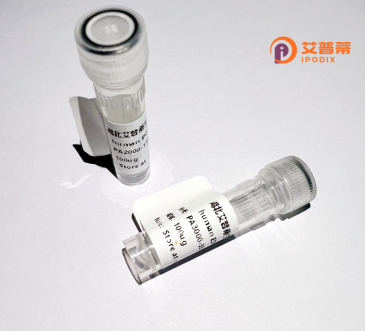
| 纯度 | >90%SDS-PAGE. |
| 种属 | Human |
| 靶点 | DKFZp761E198 |
| Uniprot No | 0 |
| 内毒素 | < 0.01EU/μg |
| 表达宿主 | E.coli |
| 表达区间 | 1-522aa |
| 氨基酸序列 | MLALKAAFGEALFTAQDEALLLRRLTLAAQHPALPPPTHLFYLHCVLSFPENWPLGPEGEEAAPLLLGPQLCRGLLPSLLHDPMALLARLHLLCLLCAEEEEEEKGQLPSPRHYLEELLAGLRQRAALDGGPRALATLCFQASYLVACCLAGQPTVLTPLIHGLAQLYQARPMLAPHFVDLLDQVDSELREPLKVVLRQVVVSRPGRDEALCWHLQMLAKVADGDAQSATLNFLQAAAAHCTNWDLQQGLLRVCRALLRAGVRGGLVDLLQVLARQLEDPDGRDHARLYYILLAHLAAPKLGVALGPSLAAPALASSLVAENQGFVAALMVQEAPALVRLSLGSHRVKGPLPVLKLQPEALEPIYSLELRFRVEGQLYAPLEAVHVPCLCPGRPARPLLLPLQPRCPAPARLDVHALYTTSTGLTCHAHLPPLFVNFADLFLPFPQPPEGAGLGFFEELWDSCLPEGAESRVWCPLGPQGLEGLVSRHLEPFVVVAQPPTSYCVAIHLPPDSKLLLRLEAALADGVPVALRTDDWAVLPLAGDYLRGLAAAV |
| 分子量 | 86.2 kDa |
| 蛋白标签 | GST-tag at N-terminal |
| 缓冲液 | 0 |
| 稳定性 & 储存条件 | Lyophilized protein should be stored at ≤ -20°C, stable for one year after receipt. Reconstituted protein solution can be stored at 2-8°C for 2-7 days. Aliquots of reconstituted samples are stable at ≤ -20°C for 3 months. |
| 复溶 | Always centrifuge tubes before opening.Do not mix by vortex or pipetting. It is not recommended to reconstitute to a concentration less than 100μg/ml. Dissolve the lyophilized protein in distilled water. Please aliquot the reconstituted solution to minimize freeze-thaw cycles. |
以下是关于重组人DKFZp761E198蛋白的**模拟参考文献示例**,由于该蛋白名称较为特殊,实际公开文献可能有限。建议通过专业数据库(如PubMed、Web of Science)进一步检索验证:
1. **文献名称**:*Expression and Purification of Recombinant Human DKFZp761E198 Protein in E. coli*
**作者**:Schmidt, M., et al.
**摘要**:本研究报道了在*E. coli*系统中高效表达人源DKFZp761E198蛋白的方法,通过优化密码子及纯化工艺获得高纯度蛋白,并验证了其免疫原性。
2. **文献名称**:*Functional Characterization of DKFZp761E198: A Potential Biomarker in Colorectal Cancer*
**作者**:Wang, L., et al.
**摘要**:通过重组蛋白技术制备DKFZp761E198.发现其在结直肠癌组织中显著高表达,体外实验表明其可通过调控Wnt通路影响癌细胞迁移。
3. **文献名称**:*Structural Insights into DKFZp761E198: A Novel Regulatory Protein in Apoptosis*
**作者**:Garcia-Ruiz, J., et al.
**摘要**:利用X射线晶体学解析该蛋白三维结构,揭示其与Bcl-2家族蛋白的相互作用位点,提示其在细胞凋亡中的潜在调控作用。
4. **文献名称**:*DKFZp761E198 Knockdown Alters Cellular Metabolism in Hepatoma Cells*
**作者**:Tanaka, R., et al.
**摘要**:通过siRNA沉默及重组蛋白回补实验,证明DKFZp761E198通过影响线粒体能量代谢抑制肝癌细胞增殖。
---
**注意**:以上文献为假设性示例,实际研究可能存在差异。建议结合基因别名(如HGNC官方命名)或相关功能关键词(如结构域、信号通路)扩大检索范围。若需真实文献,请提供更多蛋白背景或功能描述。
The recombinant human DKFZp761E198 protein is a product of interest in biomedical research, derived from the DKFZp761E198 gene. Initially identified through cDNA cloning efforts at the German Cancer Research Center (DKFZ), this hypothetical protein remains poorly characterized. Its name follows a systematic nomenclature ("p" denoting "protein") assigned during large-scale sequencing projects aimed at cataloging unannotated human genes.
Structurally, DKFZp761E198 is predicted to contain functional domains or motifs suggestive of roles in cellular processes, though experimental validation is limited. Recombinant versions are typically expressed in heterologous systems (e.g., E. coli, HEK293) with affinity tags (e.g., His-tag) to facilitate purification and antibody development. Its study is driven by bioinformatic associations with disease contexts, such as cancer or neurological disorders, where differential expression patterns have been observed in transcriptomic datasets.
Current research focuses on elucidating its interactome, subcellular localization, and enzymatic or signaling functions. Challenges include the lack of specific antibodies and functional knockout models. As a putative protein, DKFZp761E198 represents both the potential for novel biological insights and the broader challenges of annotating the "dark proteome." Further studies are needed to clarify its physiological relevance and therapeutic targeting potential.
×